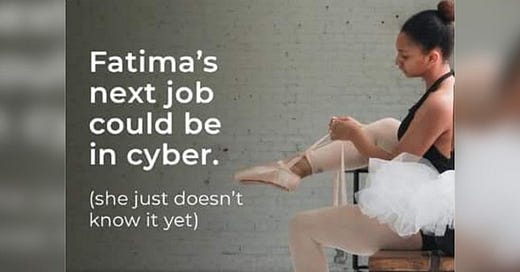In 2020 the British government released a photograph of a ballet dancer with the caption “Fatima's next job could be in cyber (she just doesn't know it yet)” followed by the slogan “Rethink. Reboot. Reskill.” This image seemed to clarify the intention of the state to drive those working in the arts into more prosaic occupations. Lockdowns could not have been designed much better to do so. Where, in the UK, company employees received furlough that paid 80% of their wages, the self-employed (including many artists) received 80% of their profits. The self-employed were asked to cover all their professional and personal expenses with less than their often meagre profits. Those arts courses that did not fold moved unsatisfactorily on-line along with choirs and even discos.
It is clear that totalitarianism does not favour independent thought. George Bush made this clear when he stated, “You are either with us or you are with the terrorists.”
David Cameron referred to those who questioned government narratives as “non-violent extremists,” conflating them with terrorists. More recently London mayor Sadiq Khan labeled anti-ULEZ demonstrators as extreme when he denounced them as “far right.”
The desire to eradicate independent thought was elucidated by WEF spokesman Yuval Noah Harari when he spoke of a “new era in which humans are now hackable animals...(and) the whole idea that humans have ...this soul or spirit and they have free will ... that's over.”
In a previous article I questioned whether the general public’s failure to recognise the authoritarian agenda could be related to a failure to cultivate creativity and imagination due to narrow parameters of education and passive entertainment.
Is there a link between creative pursuits and independent thought?
In the 1970s psychologist Mihály Csíkszentmihályi identified what he termed the flow state.
But why would this be a challenge to authoritarianism?
Investigation into the flow state found that it produced a number of benefits.
This would be unhelpful for a state and media that uses emotions to manipulate people.
Happiness and self-actualization are not helpful to a state that relies upon fear and subjugation to maintain control.
Those who value internal rewards are more resistant to the influence of external inducements and pressures.
The more competent a person becomes the more their confidence grows -making them more formidable adversaries for an oppressor.
The more skilled and creative a person becomes the more capable they are at communicating and solving problems.
To attain the flow state a task has to be intrinsically rewarding or ‘autotelic’ (from the Greek: auto=self, telos=goal). It must be challenging and require complete focus, but still be attainable. The activity must provide immediate feedback and allow for personal control over the situation and the outcome.
The flow state demands a balance between skill and challenge. This necessitates the development of a skill and the opportunity to apply it. Unchallenging occupations and passive temptations divert us from the experience.
Where the flow state is facilitated by modern technology the activity is not necessarily morally positive -such as online gambling.
Cell phone interruptions and the ubiquity of video and audio recordings deny people access to the flow state.
“According to psychologists, every time you get interrupted from a task you’re focused on, it takes you twenty-three minutes to reattain that level of focus.
On average, a college student can only stay focused on a single task for sixty-five seconds. A fully-grown adult does just marginally better, clocking in at three minutes per task.”
As the simultaneous use of two screens has become commonplace,
In contrast,
This seems to be the opposite of what was achieved by lockdown and to the desires of an authoritarian regime.
Csikszentmihalyi spoke of an autotelic personality – a person who ‘generally does things for their own sake rather than in order to achieve some later external goal’. These people develop skills that help them get into the flow state frequently, skills like curiosity, interest in life, persistence and low self-centredness.
As has been said 'No society wants you to become wise… If people are wise they cannot be exploited.'
This is the second in a series of related articles
The first is Non-Player Characters
The second is: Is Creativity Under Attack?
The third is: What Stops People Thinking?





The black mirror has much to answer for. ADHD through a screen
Brilliant Francis thank you....as an artist have felt all of this very strongly over the last 4 years as am sure many other creatives have too... maybe we need a publicised conference to bring it to wider attention,to fight back?Please keep going on this topic... it is the essence of civilisation